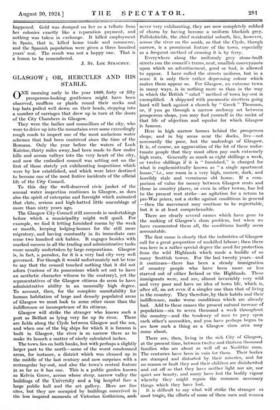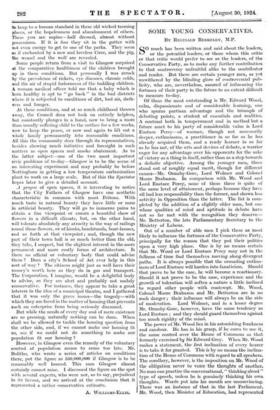GLASGOW; OR, HERCULES AND HIS STABLE.
ONE morning early in the year 1860, forty or fifty prosperous-looking gentlemen might have been observed, mufflers or plaids round their necks and top hats pulled well down on their heads, stepping into a number of carriages that drew up in turn at the doors of the City Chambers in Glasgow.
They were the bailies and councillors of the city, who were to drive up into the mountains over some exceedingly rough roads to inspect one of the most audacious water schemes that had been contrived since the time of the Rcunans. Only the year before the waters of Loch Katrine, thirty miles away, had been made to flow under hills and across valleys into the very heart of the city, and now the embodied council was setting out on the first of those stately yet exhilarating inspections which were by law established, and which were later destined to become one of the most festive incidents of the official life of the City Council.
To this day the well-deserved civic junket of the annual water inspection continues in Glasgow, as does also the spirit of enterprise and foresight which animated that elate, serious and high-hatted little assemblage of more than sixty years ago.
The Glasgow City Council still succeeds in undertakings before which a municipality might well quail. For example, we find it letting furnished rooms by the week or month, keeping lodging-houses for the still more migratory, and having constantly in its immediate care some two hundred sick babies. It engages besides with marked success in all the trading and administrative tasks more usually undertaken by large corporations. Glasgow is, in fact, a paradox, for it is a very bad city very well governed. For though it would unfortunately not be true to say that the council touched nothing that it did not adorn (various of its possessions which set out to have an aesthetic character witness to the contrary), yet the representatives of the Glasgow citizens do seem to have administrative ability in an unusually high degree. To account, then, for the complete unsuitability for human habitation of large and densely populated areas of Glasgow we must look to some other cause than the indifference or incompetence of its citizens.
Glasgow will strike the stranger who knows such a port as Belfast as lying very far up its river. There are fields along the Clyde between Glasgow and the sea, and when one of the big ships for which it is famous is built in Glasgow, the river is so narrow there as to make its launch a matter of nicely calculated inches.
The town lies on both banks, but with perhaps a slightly larger part to the north—some of the worst condemned areas, for instance, a district which was cleaned up in the middle of the last century and now surprises with a rectangular lay-out, and also the town's central feature in as far as it has one. This is a public garden known as Kelvin Grove, across whose steep, narrow valley the buildings of the University and a big hospital face a large public hall and the art gallery. Here are fine sites, but they are occupied by buildings conceived in the less inspired moments of Victorian Gothicism, and, never Very exhilarating, they are now completely robbed of charm by having become a uniform blackish grey. Pollokshiekls, the chief residential suburb, lies, however, across the river on the south, so that the Clyde, though narrow, is a prominent feature of the town, especially as a frequent method of crossing it is by ferry.
Everywhere along the uniformly grey stone-built streets run the council's trains, neat, smallish conveyances upon which- no advertisement, good or bad, is allowed to appear. I have called the streets uniform, but in a sense it is only their rather depressing colour which makes them appear so. For Glasgow, an extreme town in many ways, is in. nothing more so than in the way in which the British " salad " method of town lay-out is exemplified. A shipyard with pneumatic rivetters going hard will back against a church by " Greek " Thomson, or, if you go through a narrow archway set between prosperous shops, you may find yourself in the midst of that life of abjection and squalor for which Glasgow is famous.
Here in high narrow houses behind the prosperous shops, and in big areas near the docks, live—not necessarily the poor, but the underdogs of Glasgow.
It is, of course, an aggravation of the lot of these unfor- tunate people that they must often pay such extremely high rents. Generally as much as eight shillings a week, or twelve shillings if it is "furnished," is charged for what is euphemistically known as "a single apartment house," i.e., one room in a very high, narrow, dark, and horribly stale and verminous old house. If a com- parison of value for money between Glasgow rents and those in country places, or even in other towns, has led to the present rent strike—an agitation for a return to pre-War prices, not a strike against conditions in general —then the movement may continue to be regrettable, but it is at least comprehensible.
There are clearly several causes which have gone to the making of Glasgow's slum problem, but when we have enumerated them all, the conditions hardly seem accountable.
The first cause is clearly that the industries of Glasgow call for a great proportion of unskilled labour; then there was here in a rather special degree the need for protection from the wild Highlands which made a huddle of so many Scottish towns. For the last twenty years—and it continues—there has been a steady immigration of country people who have been more or less starved out of either Ireland or the Highlands. These immigrants were, and are, almost invariably very wild and very poor and have no idea of town life, which is, after all, an art even if a simpler one than that of living in the country. They therefore, by their habits and their indifference, make 'worse conditions which are already bad. Add to these causes the present natural increase of population—six to seven thousand a week throughout the country—and the tendency of men to prey upon each other's necessities, and you have perhaps begun to see how such a thing as a Glasgow slum area may come about.
There are, then, living in the rich City of Glasgow, at the present time, between twelve and thirteen thousand families who are about as well off as Neolithic man. The centuries have been in vain for them. Their bodies are stamped and distorted by their miseries, and for no reason or fault they and their children are disinherited and cut off so that they have neither light nor air, nor quiet nor beauty, and many have lost the bodily vigour whereby they might regain the common necessary things which they have lost. It is difficult to say what will strike the stranger as most tragic, the efforts of some of these men and women to keep to a human standard in these old wicked teeming places, or the hopelessness and abandonment of others. These you see supine—half dressed, almost without possessions. If it is fine they sit in the gutter with not even energy to get to one of the parks. They seem as if enchanted by a new and loveless Circe, and the pig, the weasel and the wolf are revealed.
Some people return from a visit to Glasgow surprised at the comparative healthiness of the children brought up in these conditions. But personally I was struck by the prevalence of rickets, eye diseases, chronic colds, and the air of stupid forlornness of the toddling children. A woman medical officer told me that a baby which is born healthy is apt to •" go back" in the bad districts where it is subjected to conditions of dirt, bad air, dark- ness and hunger.
At these conditions, and at so much childhood thrown away, the Council does not look on entirely helpless, but constantly plunges in a hand, now to bring a more than usually suffering child to the surface for a few weeks, DOW to keep the peace, or now and again to lift out a whole family permanently into reasonable conditions. All this the community does through its representatives, besides showing much initiative and foresight in such matters as open spaces and smoke abatement. As to the latter subject—one of the two most important civic problems of to-day—Glasgow is to be the scene of an interesting experiment and may probably be before Nottingham in getting a low temperature carbonization plant to work on a large scale. But of this the Spectator hopes later to give a detailed account.
A propos of open spaces, it is interesting to notice that the City Fathers of Glasgow have one aesthetic characteristic in common with most Britons. With much taste in natural beauty they have little or none in artificial beauty. They will go to immense pains to obtain a fine viewpoint or ensure a beautiful show of flowers in a difficult climate, but, on the other hand, will tolerate absolutely any atrocity in the way of railings round those flowers, or of kiosks, bandstands, boat-houses, and so forth at that viewpoint ; and, though the new part of their town hall is so much better than the old, they take, I suspect, but the slightest interest in the more permanent and more costly forms of architecture. Is there no official or voluntary body that could advise them ? Does a city's School of Art ever help in this sort of way ? The citizens might just as well have their money's worth here as they do in gas and transport. The Corporation, I imagine, would be a delightful body to advise, as they are alert and probably not unduly conservative. For instance, they appear to take a great interest in the idea of a municipal theatre, and I gathered that it was only the grave issues—the tragedy—with which they are faced in the matter of housing that prevents • such an enterprise from being seriously discussed. But while the needs of every day and of mere existence are so pressing, naturally nothing can be done. When shall we be allowed to tackle the housing question from the other side, and, if we cannot make our housing fit us, see if we could not do something to make our population fit our housing ?
However, in Glasgow even the remedy of the voluntary control of population seems to come too late. Mr. Bolitho, who wrote a series of articles on conditions there, put the figure as £60,000,000 if Glasgow is to be reasonably well housed. This sum Glasgow almost certainly cannot raise. I discussed the figure on the spot with several experts, who were not, so to say, prejudiced in its favour, and we arrived at the conclusion that it represented a rather conservative estimate.
A. WiLLTAms-ELus.



































 Previous page
Previous page